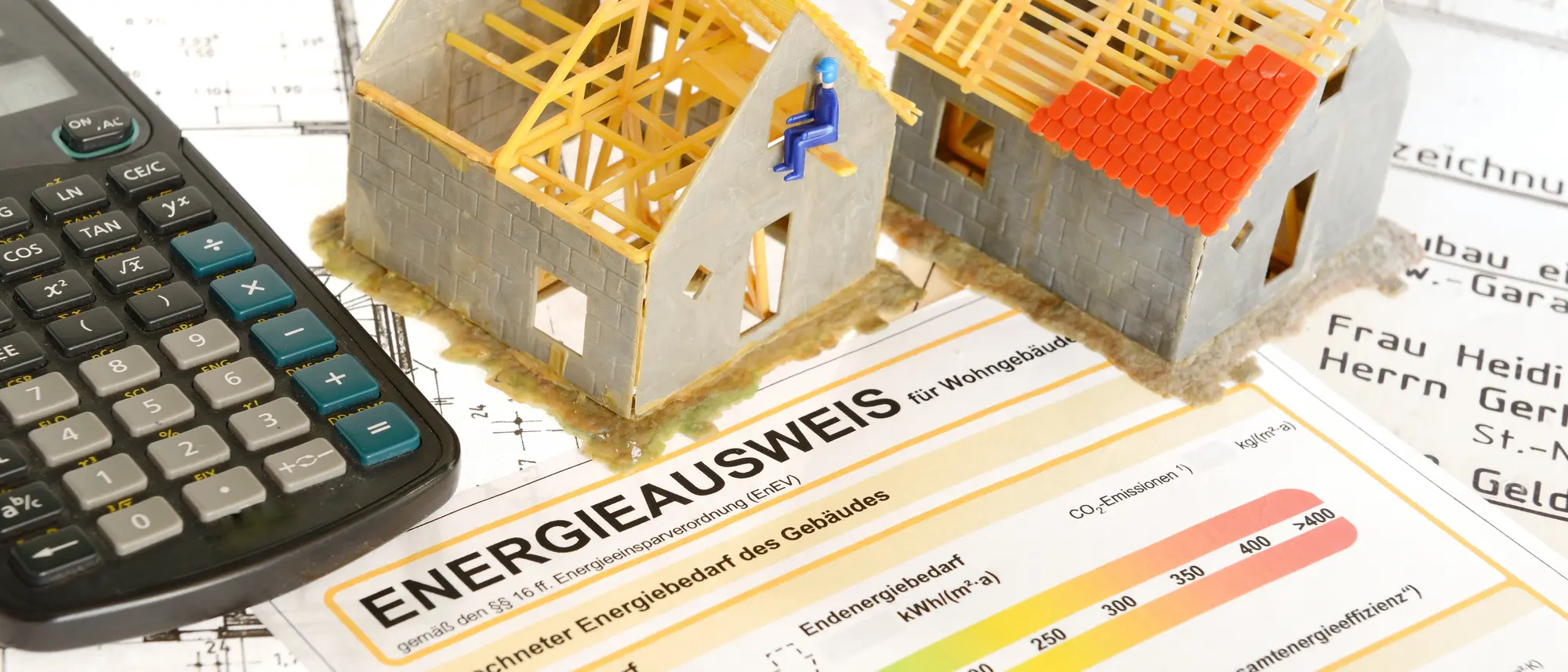What is an energy performance certificate?
Energy efficiency and climate protection are key issues of our time. As your local energy supplier, we would like to support you in optimising your energy consumption and saving costs at the same time. An important tool for this is the energy performance certificate.
The energy performance certificate gives you a clear overview of the energy quality of your building. It shows at a glance how energy-efficient your building is and where there is potential for improvement. Whether you are an owner, tenant or landlord - the energy performance certificate provides valuable information for everyone.
On this page you will find all the important information about the energy performance certificate:
- What is an energy performance certificate and what is it for?
- What types of energy performance certificate are there?
- When is an energy performance certificate required?
- How can you obtain an energy performance certificate?
Stadtwerke Gießen is a competent partner at your side. Our experts will be happy to advise you and draw up a meaningful energy performance certificate for you. Together we can make Giessen more energy-efficient and sustainable!
This is shown by the energy performance certificate:
- The energy demand or energy consumption of the building compared to other buildings
- The energy performance certificate shows owners the condition of the building and provides decision-making aids for modernisation measures
- The energy performance certificate helps tenants and buyers to estimate future heating costs and thus to make a decision on whether to rent or buy.
Two types of energy certificates:
It is based on consumption data from the last three years.
Here, the energy requirement of a building is determined on the basis of standardised calculations. The entire building with all relevant surfaces and components (exterior wall, roof, windows, etc.) as well as the existing system technology (boiler, control, hot water preparation, ventilation or air conditioning) are assessed. The energy requirement determined in this way is an objective value that represents the heating energy requirement of the property regardless of user behaviour.
Which version is suitable depends on the year of construction of the property and the number of residential units. The regulations for this are relatively complex. Our energy consultants are very familiar with the subject and can provide information on which certificate is possible or even required for which property.
How to order an energy performance certificate from us
- Are you interested in an energy performance certificate? Then simply download the energy consultation questionnaire and complete it.
- Send us the completed and signed questionnaire by e-mail to energieberatung@stadtwerke-giessen.de. For an energy assessment of the property, we also need photos of all sides of the building, the entrance door and at least one window.
- After checking the requirements, we will be happy to make you an offer for the energy performance certificate variant that is suitable for your property
- Once we have received your order, we will draw up the energy performance certificate and send it to you.
- You are welcome to discuss the results and any further modernisation measures with our energy consulting experts in person.
Frequently asked questions about the energy performance certificate:
The energy performance certificate is the energy efficiency seal of approval for a property. The document comprises at least four pages, on which the key building data, the calculated energy requirement or the recorded energy consumption of the building, comprehensible comparative values and explanations of energy-related terms are listed. It also includes modernisation recommendations and recommendations for economically viable improvements to the building's energy efficiency.
With the help of the energy performance certificate, you can easily estimate whether a property will have low or high heating and hot water costs in the future. This is an important decision-making aid that you should consult before signing a rental or purchase contract. The energy performance certificate provides objective information and makes it possible to compare the energy requirements of houses throughout Germany.
The energy performance certificate creates transparency in the property market. When energy prices are high, properties with proven low energy requirements have a competitive advantage on the property market when renting or selling. In addition, the energy performance certificate assesses the energy quality of the building, identifies any weak points in the building envelope and in the system technology and makes suggestions for the energy modernisation of the building.
An energy performance certificate is required when a house or flat is sold or rented out. The legal basis for the energy certificate is the Building Energy Act (GEG), which has replaced the Energy Saving Ordinance (EnEV). Of course, this means that a new energy performance certificate does not have to be issued every time there is a change of tenant. The energy performance certificate is valid for 10 years and can be used for as long as the building remains unchanged.
Serious prospective buyers or tenants can request to be shown an energy performance certificate, for example during a viewing of the property.
The aim of the energy performance certificate is to improve the energy efficiency of buildings. The energy performance certificate makes the energy demand or energy consumption visible and thus creates transparency in the property market.
In Germany, energy performance certificates have been mandatory for existing buildings since 1 July 2008. This date applied to residential buildings with a construction completion year up to and including 1965. For residential buildings constructed later, an energy performance certificate has been mandatory since 01.01.2009 and for all non-residential buildings since 01.07.2009.
In principle, an energy performance certificate is required for all heated buildings. This applies to residential buildings as well as administrative buildings, public buildings and factory buildings.
A distinction is made between the demand-oriented and the consumption-oriented energy performance certificate. With the demand-oriented energy performance certificate, the energy requirement is calculated under standardised conditions based on the technical design of the building. As these conditions are always the same, the energy quality of several buildings can be compared with each other. In contrast, the consumption-orientated energy performance certificate is based on the actual energy consumption over the last 3 years. It depends not only on the structural quality of the building, but also to a large extent on the utilisation habits of the residents. This results in differences that make it difficult to compare buildings.
A needs-based energy performance certificate may be issued for all buildings, regardless of size, age and type of use.
Consumption-based energy performance certificates are only permissible under certain conditions:
The consumption-orientated energy certificate for residential buildings may only be issued if:
- The building has at least 5 residential units, or
- If the building application was submitted after 1 November 1977, or
- If the building already met the requirements of the 1978 Thermal Insulation Ordinance when it was completed, or
- If the building was subsequently brought up to the requirements of the 1978 Thermal Insulation Ordinance
A consumption-orientated energy performance certificate is always permissible for non-residential buildings.
In all cases, however, the consumption data for at least three previous years must be known and verifiable on the basis of heating bills, invoices from energy suppliers or similar.
You should enquire about the price of the energy performance certificate from the respective issuer. It will be higher for the demand-orientated certificate than for the consumption-orientated energy certificate. The costs for preparing the energy performance certificate are to be borne by the owner or the community of owners of the building.
Yes, because the energy performance certificate is always issued for the entire building, not for individual flats. It assesses the quality of the outer shell (masonry, windows, roof, etc.) and the heating system. This always relates to the entire building.
There is no obligation to do so. The energy performance certificate is for information purposes and has no further-reaching effect. Nevertheless, you should take the renovation recommendations seriously. In particular, if your building is certified as having above-average energy consumption, you can noticeably reduce the burden on the environment and your wallet by taking appropriate renovation measures.



